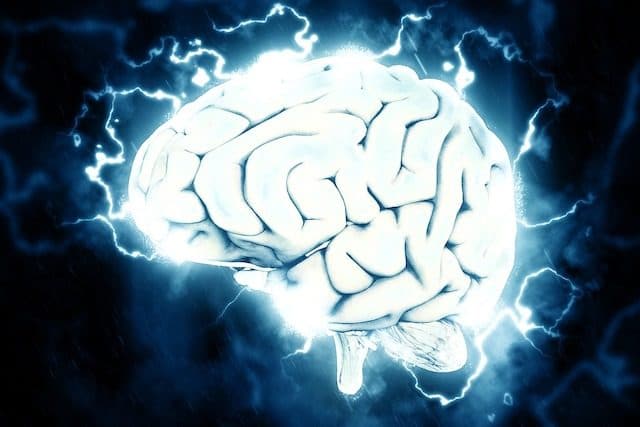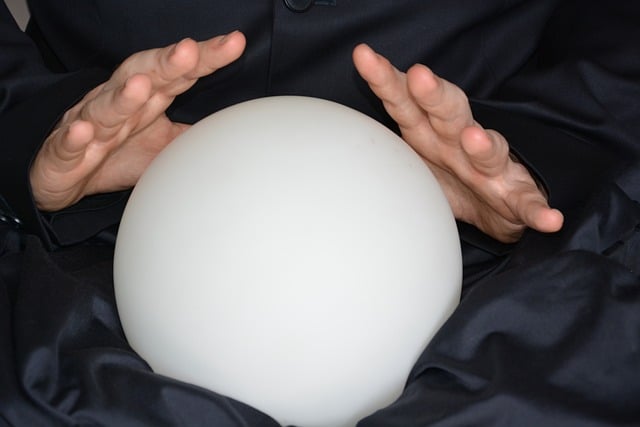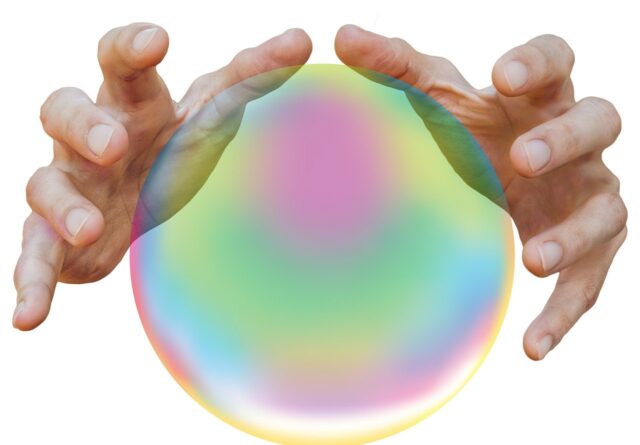Having access to impossible information, divined from spirits or gods or the thoughts of another human, is a fairly old concept. The oracle of Zeus at Dodona could supposedly offer his priests insight into the god’s will through all manner of spiritual and esoteric means.
For literally thousands of years we’ve had clairvoyance, mediums, spiritualists, oracles, prognosticators, fortune tellers, and, of course, psychics—everything from the Oracle at Delphi to Nostradamus to Miss Cleo and the Psychic Hotline.
A poll in the early 2000s suggested that as many as 57% of Americans believe in psychics or psychic phenomena. A 2019 Gallup survey dropped the number to somewhere above 25%. That’s still roughly 85 million Americans.
Over the years several high-profile psychics have been exposed undeniably as frauds. Peter Popoff was outed spectacularly in 1986 by famed skeptic James Randi. Randi proved that Popoff used an earpiece and was being fed information not from the divine, but from his own wife reading cards that audience members had filled out ahead of time.
Spoon-bender Uri Geller was put on the spot by Johnny Carson and made to look foolish when Carson brought out props that Geller had not been able to touch previously. He was unable to show any paranormal skills and was clearly agitated that they tried to test him.
Sylvia Browne, who was a frequent talk show guest for years, declared on an episode of The Montel Williams Show that missing woman Amanda Berry was dead. She said this to Berry’s mother who was there in person. Two years later that woman died believing her daughter was dead as well. Then, seven years later, Amanda Berry was rescued from an Ohio basement where she’d been held captive by a madman for 10 years.
There have been many other high-profile cases of psychics being exposed as frauds but still, the belief persists. Does that mean some of them are legitimate?
What Constitutes Psychic Phenomena?

Many things fall under the umbrella of psychic phenomenon. Traditionally, most of us would regard a psychic as a person who can read minds. That is they engage in telepathy. Think Professor X from the X-Men. This person can hear the thoughts of another human being through some as-yet-not-understood means.
Some people who are psychics claim to be mediums. This is a slightly different phenomenon. A medium, as the name suggests, is someone halfway between something. In this case, you could consider it halfway between this world and the next. A medium can bridge the gap between life and death and talk to spirits or angels who, according to this theory, know people’s secrets, their thoughts, and their history. So the medium doesn’t directly read your mind, instead, they are in contact with a spiritual entity that provides them with information.
Famous psychics like Sylvia Browne or Theresa Caputo claim to be mediums.
Beyond anything that relates to reading minds or seeing the future, which could be considered prognostication, psychic phenomena could also include things like moving objects with your mind, remote viewing, speaking to the dead, or anything that defies what we currently understand the limitations of the human mind.
The Evidence For Psychic Phenomena

If you’re a natural skeptic, you may be inclined to dismiss the idea of psychic phenomena out of hand. There is no current, credible scientific evidence to support the idea of psychic phenomena. Even many of those who do things like hunt ghosts for a living point out that they have found no credible evidence. But that doesn’t mean no one has found evidence.
Arguably the strongest evidence in support of psychic powers comes from the CIA. For many years the conspiracy-minded talked (and still talk) about secret CIA experiments that focused on psychic spies and other such paranormal and supernatural phenomena. It would all sound very silly if not for the fact that the CIA declassified the information around what later became known as the Stargate Project which confirmed it was all true. They absolutely looked into psychic abilities to see if remote viewing was a possibility.
Remote viewing is the idea that a person can be right there next to you but see something in another room, another country, maybe all the way across the world in their mind. You can see where this would have great benefits for spies. During the Cold War, the CIA and the military were willing to give anything a try.
The CIA’s remote viewing experiments lasted from 1972 until 1977. The project was handed off to the US Army and the Defense Intelligence Agency after that where it continued until it was terminated and declassified in 1995.
When the program was closed out, it was acknowledged that there was no strategic benefit to remote viewing. It couldn’t be used as a method of spying on your enemies, and they didn’t want to waste their time looking into it anymore. sounds cut and dry, right? Except the final report did indicate that the remote viewing experiments they conducted led them to believe that there had to be something there. The accurate results they got defied randomness, but it was too sporadic and inconsistent to be of any use.
So, in a nutshell, the CIA concluded that there was reason to believe this kind of extrasensory perception was real but unusable.
Experiments into remote viewing have confirmed a slightly higher-than-average success rate. Participants were asked to view an image and then “send” the idea of it to someone by thinking it to them. The receiver then views four images, one of which is the “sent” image. Random chance says it should be one in four odds, but the experiments were up around one in three. Those aren’t great numbers, but they are significant.
How can we even reconcile the possibility of psychic powers with any kind of rational science? Well, as some have pointed out, we can’t even explain consciousness in any proper way and that’s something we all experience. That in no way proves psychic phenomena, but it does offer room for the possibility that there are many things we don’t understand about how our brains work.
Psychologist Daryl Bem, a man respected in his field, focused his research on testing the idea of precognition. He studied 1,000 people over eight years and concluded that there was a case for the idea of precognition. In some of his tests, he had subjects try to remember a list of words and then write them down.
After that, a computer randomly selected some words to ask the people more questions about. People remembered more of the words they were asked about than those they didn’t, but they had done it before they were asked. Because it happened at a rate greater than chance this, seemingly, confirmed a precognitive ability.
Bem conducted nine different tests in total and felt he had garnered enough evidence by the end to support the belief that ESP was a real thing.
The Evidence Against Psychic Phenomena

In response to the statistical anomalies discovered in the CIA tests and others that would lend support to the idea psychic powers may be real, psychologist Ray Hyman pointed out that statistical anomalies, while certainly interesting, cannot prove the ability to perform heretofore unknown cognitive tasks alone.
To put it another way, if a statistically unusual number of cookies go missing in your cupboard, it doesn’t prove you have a cookie monster. It just proves the cookies are missing. As is sometimes said, extraordinary claims require extraordinary evidence and statistical anomalies don’t cut it.
Research has also been conducted into how similar experiments are performed and then published later on. Questionable research practices have been identified in many studies into paranormal phenomena including things like dropping studies that don’t have favorable results or eliminating subjects who don’t produce favorable results. These and other factors can skew how data is interpreted in a way that produces those statistical anomalies.
Dr. Bem’s research was met with heavy skepticism after it was published. Other researchers tried to replicate his results and came up with nothing. In addition, he had a back-and-forth with James Alcock in the Skeptical Inquirer as Alcock tried to poke holes in Bem’s methodology and Bem tried to defend himself. In the end, it brought more scrutiny to Bem’s research and that led to the experiments which couldn’t replicate his results.
One thing that did come to light during the attempt to replicate Bem’s experiments was that the researchers who conducted the follow-ups found difficulty publishing their results. Bem had his paper published in a respected journal which is what drew so much attention in the first place. But they had no interest in publishing the follow-up which had less spectacular results. This led to accusations of a publication bias, the idea being that they chose the sensational story to publish and not the more mundane refutation of it.
One of the basic tenets of the skeptical position towards psychic phenomena is the simple lack of common knowledge. If people could predict the future, read minds, and move things with their minds, wouldn’t all of us have experienced that already? It seems unlikely that such a thing would be so clandestine or rare that there would be no real evidence of it after all this time.
There is, however, plenty of evidence of fraud and hoaxes in the world of psychics. Patrice Runner was convicted of using a psychic scam to con victims out of $175 million. Marie Duval conned over 1.4 million people over 20 years and made more than $200 million.
For nearly 20 years James Randi, the man who exposed Peter Popoff, had a million-dollar prize for anyone who, under controlled conditions, could demonstrate any kind of verifiable paranormal power. No one ever succeeded.
In more general terms, psychic claims often just fail basic tests under scrutiny. The way a so-called psychic is accepted by people inclined to believe in them already is a known and studied phenomenon called the Forer Effect or Barnum Effect. The psychic says vague things that could apply to anyone but because they apply to me, and I view the world as the main character in my own story, I’m more easily convinced that the psychic has supernatural knowledge.
The Need for Extraordinary Evidence

The statement “extraordinary claims require extraordinary evidence” was popularized by Carl Sagan. It has long been a sort of rallying cry for the scientific skeptic because it demands that anything we view as strange or unusual justify our belief in it. It’s no different from the idea of “if it seems too good to be true, it probably is” and other words of caution against being gullible or easily swayed. Science needs to rely on proof and good proof, or it’s not science at all.
Much of what we accept about the world is based on our current understanding of the world. If someone tells you they have a black cat, you’re not going to demand an extraordinary amount of evidence to prove that fact. You have probably seen a black cat before; you know how common they are, this is not an extraordinary claim.
If someone tells you they have a black cat that can sing show tunes, then you’re going to want some proof. Cats don’t typically sing. You could go so far as to say cats cannot sing. That’s a bold claim. It’s making the statement about every cat in the world that you have never seen in person. But you’re relying on what you know of cats to make that statement. It’s up to someone else to prove you wrong in that case.
Our experience in the world, as a whole, is that psychic phenomenon is not real. When someone claims it is, they need outstanding proof to back it up. It can’t be someone’s word, it can’t be a simple demonstration that isn’t allowed to be scrutinized.
Some researchers will go so far as to say, unequivocally, that there is no such thing as the paranormal in any capacity. Alcock and Reber once wrote that they don’t even need to read evidence for it. In much the way they don’t need evidence of how pigs can fly to refute the statement “pigs can’t fly” they don’t need to read evidence for psychic phenomena because the premise is wrong so who cares what evidence you found to support it?
At this point, it seems safe to say that there is no irrefutable evidence to suggest psychic abilities are real. But science is meant to be nothing if not open-minded and perhaps the future can lead us down a path that explains more if there’s more to know.